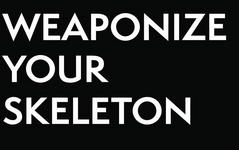Hitter or Quitter?
Most of what goes on in martial arts and combat sports works because people quit. They quit because it hurts, or because they’re exhausted, or because they start to listen to the little voice that’s telling them everything will be a lot better if they’d just give up and give in. More often than not it’s a combination of all these things at once; the question gets asked often enough, with each blow, “Why don’t you just quit?”, until they hit that personal threshold and just can’t take it anymore.
Any technique that isn’t about career-ending, crippling injury is about compliance, about making the person submit—trying to convince them to quit. This is fine when the outcome isn’t critical, when what happens next is nice and social. It’s great for competition and the dojo. In fact, without this, sport becomes impossible, filled with sickening “accidents” and truncated careers; the dojo runs out of students as they succumb, one by one, to the brutal endpoint of their training.
Relying on your ability to make people quit, to have a higher pain tolerance, better conditioning, and an indomitable will—to outlast your foe while working them to the point where they cave—will get you killed in the place where those things don’t matter. If your would-be murderer is a quitter at heart, chances are you’ll be fine. But if they aren’t… if they don’t care about pain, or how tired they are, or if they lack that little voice that the sane call caution, well, then they’re not going to quit. Unless you know how to remove choice from the equation, they’re going to kill you. Even if it takes them a little bit of work to get you there.
If they’re a killer, they know it’s not about making you quit. They know it’s not about technique, or speed, or strength. It’s about results. They won’t waste their time engaging or setting you up. They’ll go straight for those results, breaking you, shutting you down to the point where there’s nothing you can do—not even quit—they’ll remove choice from the equation and treat you like meat to be butchered.
Your only hope is to know how to get those results, too—to know why those results happen so you can make them happen every single time, and get it done first. Toughness, bravado, ego, superior technique—these things mean nothing in violence. Going against a killer when the prize is your life is no time to hope for the best with a suitcase full of techniques you don’t fully understand—techniques that you hope will work but can’t articulate why they do. If you don’t know, with surety, the result you’re gunning for, and why that result occurs, you’re out of your league when it comes to violence.
And in violence there are only two kinds of people: those who know what they’re doing—precisely—and the dead.
— Chris Ranck-Buhr (from 2008)



Leave a Reply
Want to join the discussion?Feel free to contribute!